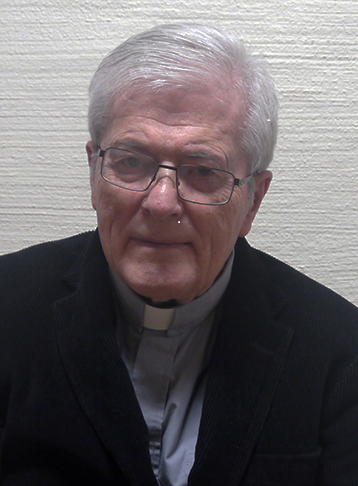
Father Paul D. Belliveau, MM
Born: September 11, 1937
Ordained: May 24, 1969
Died: October 21, 2023
Father Paul D. Belliveau died on October 21, 2023 in the Assisted Living Unit at Maryknoll, New York. He was 86 years old and a Maryknoll priest for 54 years.
Paul Denis Belliveau was born, along with his twin sister, Pauline, in New York City on September 11, 1937 to Joseph Denis and Celina Cottreau Belliveau, who came to the United States from Nova Scotia, Canada. He was one of seven children. Paul attended St. Andrew-Avellino Grammar School in Flushing, New York and graduated from Flushing High School. He attended City College of New York at nights and worked as an accountant for five years before entering Maryknoll College, Glen Ellyn, Illinois, in September 1962. After graduating from Glen Ellyn he earned a Bachelor of Business Administration Degree and a Bachelor of Arts in Philosophy. He studied at the Maryknoll Seminary, Ossining, New York and received a Masters of Divinity Degree. He was ordained to the priesthood on May 24, 1969.
In June 1969, Father Belliveau was assigned to the Maryknoll Region in Guatemala. After Spanish language and cultural studies at the Maryknoll Language School in Cochabamba, Bolivia, he was assigned to work in the diocesan catechetical center in Huehuetenango, Guatemala. From his contact with indigenous men in Guatemala, he learned that being poor could mean dying from hunger, injustice and oppression. As a result, the main emphasis of his work there was to uphold and defend the dignity of the poor.
Father Belliveau was then assigned to the National Cooperative Movement for the formation of adults in El Salvador, at the request of the Archbishop. From his work with the Salvadoran farmers and rural workers in La Libertad, he learned more about the injustices and desperate situations of the poor. The primary focus in his work there was to bring together both women and men to collaborate in addressing their economic challenges.
From December 1972 to July 1975, he was assigned to the Maryknoll Development Department. After this, Father Belliveau returned to Guatemala and was assigned to work with a team of Maryknollers (two Sisters and three priests) in San Pedro Sacatepéquez, Western Guatemala. For five years he worked with the descendants of the Mayan Indians in a time of growing political and social turmoil. From his work with indigenous people in another catechetical center, he witnessed the joy of seeing the poor come alive in spite of being surrounded by war and conflict.
From January 1981 to July 1985, Father Belliveau was asked by his Maryknoll Superior to open a new mission together with one Maryknoll Brother and two Maryknoll priests in the tropical city of San Pedro Sula, Honduras. For the first three years in this new parish, he visited families five days a week in order to get to know and dialogue with the people. In this urban setting, he strengthened his dedication to accompany the people in their struggle for justice.
From August 1985 to January 1988, Father Belliveau was assigned to work in a United Nations refugee camp in Western Honduras, at the request of the Bishop of Santa Rosa de Copan. With a team of one Maryknoll Lay Missioner, one Maryknoll Brother and two priests, he worked with 11,000 Salvadoran refugees who had been forced to flee their homes and had survived two major massacres. Here, the team lived in solidarity with the people and learned to listen to their cry of pain. In the camp, the Eucharistic Liturgies were true celebrations of life over death and love over hate.
From May 1988 to May 2001, Father Belliveau worked with another Maryknoll Priest in six neighborhoods of Zone 18, Guatemala City. In Zone 18, he found: poverty, hunger, inadequate housing, sickness, social injustice, unemployment, youth gangs, alcoholism, drug addiction and prostitution. The main emphasis of his work there was to help people discover a new image of themselves, God and Church. This was done through parish retreats, the formation of Basic Christian Communities, leadership training, catechesis and community building. From his work there, he discovered a God who loves us and comes to us through human weakness.
In reflecting upon his years in mission in Central America, Father Belliveau said, “I have been touched by the suffering of the people, their great faith and the martyrdom of many friends. The poor have evangelized and challenged me to discover the God of Life in a harsh reality. It has been a privilege to witness the Spirit of God, alive and growing in these people.”
In May 2001, Father Belliveau was assigned to work with the Maryknoll Border Team in El Paso, Texas and Ciudad Juarez, Mexico. There he discovered the face of Jesus in the undocumented, those who were considered illegal, and were strangers, individuals who continue to be rejected by many people today.
Father Belliveau continued in this work until late 2003 when he returned to Maryknoll, New York. He was assigned to the Senior Missioner Community in February 2004. In March 2005 he was appointed to Pastoral Ministry at St. Teresa’s Residence to serve the Maryknollers who worked in foreign lands and had to return to the United States due to illness and old age. Father reflected that the Maryknollers at Mission St. Teresa’s taught him how to carry the Cross and live and die with dignity.
In 2015, Father Belliveau published a book entitled Lest We Forget, which described his experiences in Central America. He asked readers of the book to STOP, REFLECT and PRAY.
Father Belliveau continued to reside at the Society Center in Maryknoll, New York. He enjoyed photography and had several exhibits displayed at the Maryknoll Center.
